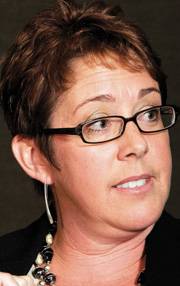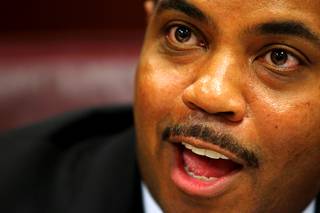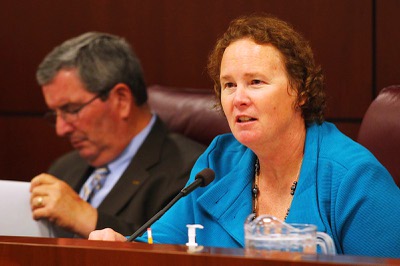
Sam Morris / Las Vegas Sun
Senators Joe Hardy, left, and Mo Denis confer during a meeting of the Senate Revenue Committee on the second day of the 2011 legislative session Tuesday, February 8, 2011 in Carson City.
Wednesday, Feb. 9, 2011 | 2 a.m.

Lynn Warne
Sun archives
- Sandoval will need to write in loophole to pass budget (2-5-2011)
- Senior programs not spared from cuts in Sandoval budget (2-2-2011)
- Gov. Brian Sandoval’s budget means job, service cuts for Clark County (1-26-2011)
- State budget plan heavy on cuts, light on solutions (1-25-2011)
- Soft words during State of the State hide Nevada in pain (1-25-2011)
- Teachers not pleased with most of Sandoval’s speech (1-25-2011)
- In response, Democrats say taxes might be part of budget solution (1-24-2011)
- State of the State: How doors could open for Nevada (1-24-2011)
- Is Brian Sandoval’s ‘shared-sacrifice’ budget the solution to state’s economic woes? (1-23-2011)
- Most vulnerable await budget cuts with trepidation (1-23-2011)
- Increasingly worried liberals seek pushback on Sandoval budget (1-21-2011)
- Construction industry: Raise taxes for job growth (1-20-2011)
- Groups seek higher taxes on tobacco and gasoline (1-20-2011)
- Sandoval warns of consolidation, job losses in state government (1-19-2011)
Nevada liberals and labor leaders have quietly begun to warn lawmakers that if the Legislature doesn’t pass a tax increase to preserve state services, they are prepared to take the issue directly to voters.
Gov. Brian Sandoval has proposed significant cuts to social services, higher education and K-12 schools to balance the budget. Democrats and advocates for those services say the cuts would cause irreparable damage. But these pro-tax forces face an uncertain future in dealing with the state’s $2.2 billion deficit.
“If the Legislature doesn’t have the political will to address the situation, citizens will do it themselves,” said Lynn Warne, president of the Nevada State Education Association, which represents teachers. She said the union has been in talks with business leaders, labor and other groups about an initiative petition, but that it has yet to develop into a formal proposal.
Democrats, moderate Republicans and some business leaders face a high hurdle in gathering votes to pass a tax increase this year. It takes a two-thirds majority in the Assembly and Senate to pass a tax increase and override a veto from Gov. Brian Sandoval, who campaigned on a promise to balance the budget without raising taxes.
A vote of the people would take longer to implement than legislative action. But raising taxes through a ballot initiative would require approval from only 50 percent of voters rather than the two-thirds required in the Legislature.
Groups interested in raising taxes are far from settled on a tax package to present to voters. Most still hope the Legislature will find the votes to raise taxes.
A ballot initiative would face its own hurdles. Veterans of the process say it would require funding of close to $500,000 to gather enough signatures, survive inevitable legal challenges and get it passed.
But the fact that such a proposal has reached the serious-talking stage reflects the deep frustration with the Legislature from some quarters.
“If we don’t address our tax structure in a meaningful way this session, I think you’re going to see an initiative petition,” said state Sen. Sheila Leslie, D-Reno.
She said there’s anger among the public over the amount of money mining contributes to state coffers; she thinks voters would back some sort of corporate income tax.
“There’s a lot of frustration,” said Jim Richardson, lobbyist for the Nevada Faculty Alliance, which represents higher education faculty. “I’ve been at this a long time. If the political leadership can’t straighten out our tax structure, then groups will coalesce to take it to the people.”
The Faculty Alliance has not formally considered a proposal, Richardson said. Instead individuals within higher education have brought up the issue to leadership.
In public opinion polls, Nevadans have shown support for raising taxes on mining, which is prospering with the rise in gold prices, and gaming, which is prospering internationally.
The Legislature, which meets every other year for 120 days, has been pressured by those industries to pass a broad-based business tax, which has been opposed by the broader business community. Mining and gaming have argued that they bear a disproportionate share of the state’s tax burden compared with other businesses.
There are two paths proponents could take in pursuing a tax initiative, neither of which would provide immediate relief for a state government.
The first would be through changing the Nevada Constitution, which would require two votes of the people, in 2012 and 2014, before becoming effective, according to former Deputy Secretary of State Matt Griffin, now an election attorney with Capitol Company.
The second would be an initiative petition to change state law. It would require proponents to gather about 76,000 signatures. If successful, the 2013 Legislature would consider the measure in the first 40 days and either pass, reject or recommend an alternative to compete on the ballot. If it is not passed by lawmakers, it would go to voters in 2014 and could be implemented in 2015.
Any vote of the people would rankle the political establishment, which has long argued that the Legislature is the appropriate venue for thoughtful policy debate.
“I don’t know what the definition of the legislative process not working is,” said Steve Hill, past chairman of the Las Vegas Chamber of Commerce. “It would seem it’s the legislative process not working the way they wanted it to.”
The chamber has historically opposed most ballot initiatives, Hill said, because “it’s fought by special interests, sound bites, and does not allow thorough and reasoned consideration.”
He said the chamber is still measuring Sandoval’s budget and whether the cuts proposed to education are workable.
Tim Crowley, president of the Nevada Mining Association, said an initiative “is not the greatest way to get thoughtful input on tax policy.”
He said the Mining Association “puts a lot of faith in the legislative process. And what you’ve seen historically is it’s deep-pocketed entities with agendas that can pass initiatives.”
Senate Majority Leader Steven Horsford, D-North Las Vegas, said he is aware of the talk about a populist initiative.
“The public always has a right to bring a tax initiative,” he said. “My focus as a legislator is to pass a balanced budget.”



Join the Discussion:
Check this out for a full explanation of our conversion to the LiveFyre commenting system and instructions on how to sign up for an account.
Full comments policy